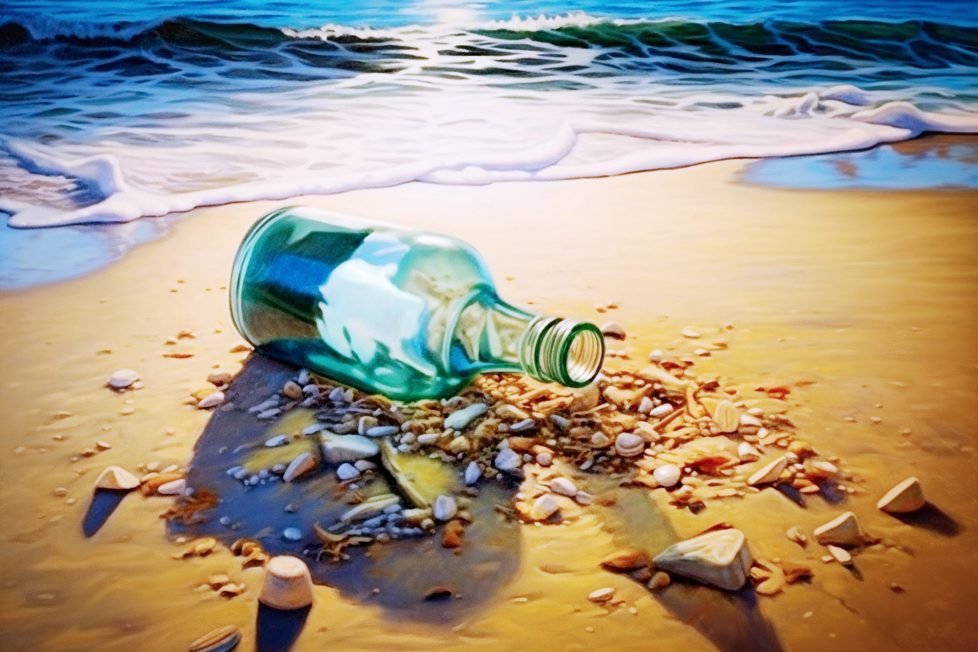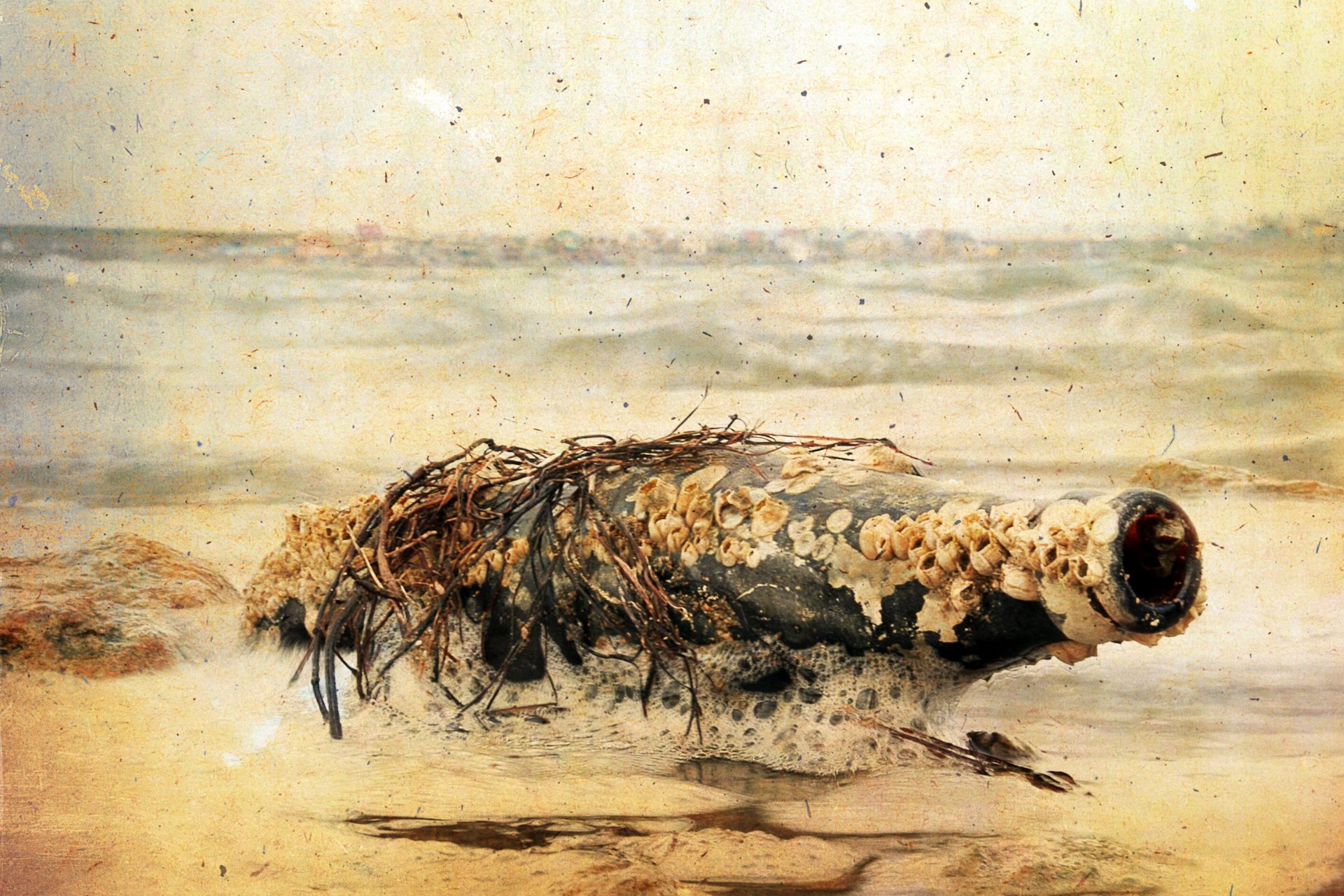8 Mysterious Messages in a Bottle — Voices from the Past
From tales of love and war to cosmic invitations, these messages in a bottle captivate our imagination.

From tales of love and war to cosmic invitations, these messages in a bottle captivate our imagination.

Table of Contents
ToggleIn the vast expanse of the world’s oceans, mysterious treasures lurk beneath the waves. While many remain undiscovered, messages in bottles have come to the surface, giving us a glimpse into the whispers of the past. We must explore the puzzle pieces of history, uncovering the secrets held within these messages. These tales of longing hope may just unravel a thrilling plot like that of a Hitchcock movie.
An original “Cast Away” story, the treacherous journey of Chunosuke Matsuyama and his 43 ship mates proved to be a remarkable plea for survival. As young sailors aboard a Japanese vessel, the crew embarked across the Pacific Ocean in the late 18th century on the hunt for treasure. Despite their optimism, their trip would end stranded on an uninhabited island with no means of communication.
The situation quickly became dire as supplies dwindled, and Matsuyama knew that he needed to do something, anything to try and persevere. He gathered coconut bark and sat down to write.
Matsuyama wrote about the crew’s shipwreck, about their slow and painful starvation on an unknown Pacific Island, and their deaths that were too close for comfort. Sealing it in a bottle, Matsuyama cast it into the vast ocean before dehydration and starvation took his life mercilessly.
The crew’s explanation of their disappearance wouldn’t be discovered for over 150 years, the final plea for survival left unanswered.

Among the many stories of heroism and tragedy, as well as the argument about whether Jack could fit on the door with Rose, one tale stands out with mystery and desperation: Jeremiah Burke’s enigmatic farewell message.
A young, Irish immigrant, 19-year-old Jeremiah Burke found himself on the Titanic in search of a new life in America. When this dream turned into a nightmare, Burke took the opportunity amongst the chaos to scribble a final, heartfelt note to his family. Sealing it tightly in a glass bottle, Burke cast his message into the depths of the ocean.
The bottle was discovered a year later on the Irish Coast as a remnant of the troubling tragedy. Stained with the salt of the sea, a coachman discovered the ominous bottle, opening its contents. The message read: “From Titanic. Good Bye all. Burke of Glanmire, Cork.”

The ravages of war have a way of etching stories into the pillars of history, one of them being the echo of Thomas Hughes’ final profession of love. In 1999, Hughes’ message was pulled in by a fisherman, an unaware conduit between past and present.
Among his catches of the day, the fisherman discovered a weathered bottle, its contents uncovering a glimpse into the final days of a World War 1 soldier. Young Private Hughes was sailing to the front in France, spilling his heart out onto the pages of a letter to his beloved wife at home.
His words painted a picture of longing and love during the horrors of war, sealing it with his final words:
“Ta ta my sweet for the present, your hubby.”
Tragically, fate had a cruel twist in store. A mere two days after writing the letter, Private Hughes fell on the battlefield, his life prematurely extinguished. The fisherman, Steve Gowan, holds the letter hostage to this day from Hughes’ now deceased wife and pleading daughter, who was only two years old when her father left for battle.

In the unforgiving feat of the Arctic, the tragic tale of Sir John Franklin’s ill-fated expedition lingers in his chilling message left behind. In a daring trip to discover the long-sought Northwest Passage in 1845, Franklin’s two ships were equipped with hope and determination.
As months passed, the villain of the Arctic ensnared Franklin’s vessels in ice, rendering them immobile. In a bid for survival and explanation of their failures, the crew scribbled a message among the unforgiving winds.
Numerous expeditions were launched to find Franklin and his crew, but their messages wouldn’t be discovered until 1859 by a crew assembled by the determination of Franklin’s grieving wife. The message documented the many months that the crew fought for their lives against the unyielding cold, recording the death of Sir John Franklin in June of 1847.
The story of Franklin’s Arctic message captures the spirit of exploration coupled with the somber realization of the grave risks. Franklin’s legacy beckons us to contemplate the bravery and legacy of those who push the boundaries of human exploration.

Sometimes, fate reveals itself in the most intricate ways. In the early 1950s, a simple act of sending a message in a bottle across the Mediterranean sea would forever change the lives of two individuals.
Ake Wiking, a young Swedish man washed away by the sea of loneliness, embarked on a quest for love. Casting a message of love and devotion into the sea, he hoped it would reach the attention of a young, beautiful woman who would agree to be his soulmate. Little did he know it would be discovered by an Italian man.
This man would read the message and be touched by its sentiment, passing it along to his niece Paolina. As she read the words on the page, she would be entranced by the sweet nothings of a stranger, beginning a chain reaction of messages back and forth detailing shared dreams and aspirations.
Over time, the two couldn’t bear to be apart any longer. Finally, over a year after Paolina’s first message from Ake, the two met face-to-face, marrying and finding their own happy-ever-after against all odds.
“Dear Ake” was the movie of their love story, the affection they had cultivated so strong that it transcended the distance between them.

On a seemingly normal day, Peter Brandt stumbled across a hidden message that contained the whispers of his family’s past. The note, written by his grandfather between the two World Wars, bore an ominous tinge as it detailed that the “difficult times of war lie behind us.” The man’s name was Will Brandt, and his message foreshadowed the war that was to come.
The interwar period was a time of uncertainty and fragile peace, with citizens of the world still recovering from World War 1. Will Brandt spouted hopes of stability and prosperity in the years ahead through his letter, eager to bury the horrors of the past.
Fate had other plans in store, as just a few years later, Will Brandt found himself enlisting as a soldier in World War 2. He was captured and brutalized, somehow managing to survive it. The message stood as a reminder of Will’s hopes that were squandered by destruction.

Tyler Ivanoff was gathering firewood on the shores of Alaska when he discovered a mysterious, green bottle with a note inside. What he read on the page was a language he couldn’t understand, posting it to Facebook in hopes of finding its meaning.
Russian users were quick to respond to Tyler’s plea, identifying the message as a greeting from a Cold War sailor, one that beckoned a response with an address. A relentless search ensued to find the sender, eventually being tracked to 86-year-old Captain Anatoliy Batsanenko.
Russian newscasters watched as the Captain teared up when viewing his note and bottle from half a century ago aboard the Sulak. His note of greeting ignited a surprise reunion between Captain Bastsanenko and his past.

In 1977, as Voyager 1 and Voyager 2 set off on a mission to explore the reaches of our solar system, they carried with them a gift from humanity: The Voyager Golden Records. The phonograph messages imbued with sounds and images were Earth’s own “message in a bottle,” to extraterrestrial life.
Conceptualized as a time capsule of sorts, the records aimed to present the essence of Earth’s people, showcasing the diversity of life, nature and achievements of humans. From music to the chirping of birds, glimpses of human life were offered to any foreign bodies that may discover it.
The Voyager Golden Records represent humanity’s unending curiosity and desire to leave a lasting legacy across the universe. They carry the hopes, dreams and collective knowledge of our species.

In the vast tapestry of human history, messages in bottles have served as vessels of hope, longing and connection. From the chilling Arctic expedition, to the romantic tale of Ake and Paolina, these eight remarkable messages traverse the realms of time and space. May we continue to discover and preserve the messages that shape our history, as we ourselves may even be the authors that cast our letters forth.
